Know Better, Do Better
You know that Maya Angelou saying, “once you know better, do better”? In a similar vein, once you know, you can’t not know. I keep thinking my children are going to have some wildly transformative and revelatory moment of I-can-change-the-world and insist upon doing so…but instead, some days we straight up battle to get their school work done and they seem inured to the ceaseless struggle to survive around them. I don’t mean inured in an uncaring, “sucks to be you” kind of way, but more of a non-judgmental, simply seeing people as they are kind of way, they are no longer shocked by poverty, simple living with primitive resources and village life. Throughout our journey we have paddled, hiked, walked, trekked, ridden and flown over, around, through and past some of the world’s impoverished areas.Areas where there are no modern toilets, yet more cell phones, areas where arranged marriages are the norm, areas where children haven’t had a warm shower in a lifetime. Sometimes we speak about what we see; sometimes we let the experience speak for itself. What I do know is that when our girls see children, they simply see a playmate, regardless of skin and hair color, no common language, runny noses and ripped up, mixed-matched clothes, the girls are always quick to engage and find common ground; a ball, a dog, a wheelbarrow turned chariot. They can play with anyone.But, will this whirl around the world inspire them to truly create global equal playing grounds when they “grow” up? Sometimes I wish they would come up with some revolutionary idea to solve the world right now!
I keep thinking my children are going to have some wildly transformative and revelatory moment of I-can-change-the-world and insist upon doing so…but instead, some days we straight up battle to get their school work done and they seem inured to the ceaseless struggle to survive around them. I don’t mean inured in an uncaring, “sucks to be you” kind of way, but more of a non-judgmental, simply seeing people as they are kind of way, they are no longer shocked by poverty, simple living with primitive resources and village life. Throughout our journey we have paddled, hiked, walked, trekked, ridden and flown over, around, through and past some of the world’s impoverished areas.Areas where there are no modern toilets, yet more cell phones, areas where arranged marriages are the norm, areas where children haven’t had a warm shower in a lifetime. Sometimes we speak about what we see; sometimes we let the experience speak for itself. What I do know is that when our girls see children, they simply see a playmate, regardless of skin and hair color, no common language, runny noses and ripped up, mixed-matched clothes, the girls are always quick to engage and find common ground; a ball, a dog, a wheelbarrow turned chariot. They can play with anyone.But, will this whirl around the world inspire them to truly create global equal playing grounds when they “grow” up? Sometimes I wish they would come up with some revolutionary idea to solve the world right now!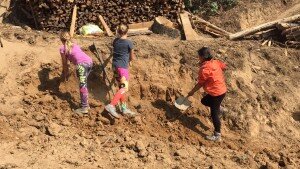 I would think trekking to remote villages where school is a privilege and great honor for children would inspire more appreciation for their own school yet later that week they continued to argue to complete their online tasks.I wasn’t kidding when I posted that I was at once demoralized and exalted the other day after six straight hours of teaching grammar, usage and mechanics of English to Finley, my ten year old. Her resistance coupled with her struggle with some of the easiest work was unraveling my already weak excuse for an elementary school teacher.I’m not that great at the patient school-marmish teacher bit…I am an inexperienced elementary school teacher, which was, by the way, nowhere on my list of what I want to be when I grow up.I am a self-proclaimed nerd. In addition to experiences, adventure and an integrative approach to learning, I highly
I would think trekking to remote villages where school is a privilege and great honor for children would inspire more appreciation for their own school yet later that week they continued to argue to complete their online tasks.I wasn’t kidding when I posted that I was at once demoralized and exalted the other day after six straight hours of teaching grammar, usage and mechanics of English to Finley, my ten year old. Her resistance coupled with her struggle with some of the easiest work was unraveling my already weak excuse for an elementary school teacher.I’m not that great at the patient school-marmish teacher bit…I am an inexperienced elementary school teacher, which was, by the way, nowhere on my list of what I want to be when I grow up.I am a self-proclaimed nerd. In addition to experiences, adventure and an integrative approach to learning, I highly 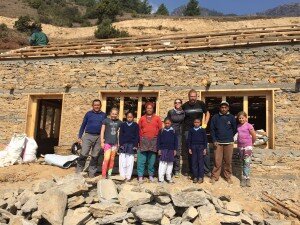 value formal education, particularly ensuring my children know the basics like the distinctions among there, their and they’re. I believe education is a both/and. We can learn from masters in a didactic way and through experience with the most informally educated in great ways, as well. Our girls are getting a bit of both (except the master piece, even though I have a Masters degree, I bet they would both agree that I am not the master of elementary education)…Our time in Nepal was heart-expanding, heart-warming and heart-breaking all at once. I loved Nepal. I was moved by the warmth of the people we met and inspired by the mountain views (side note: the Himalayas look so soft and fluffy and inviting to climb, I should know better)…but as a therapist, there are some things I can’t “unknow”, like the spark individuals get when they have a passion, a vision, a self-designed dream that lights them up. This sparks wakes up the community and everyone around them. There is excitement, energy and action! What I see in many faces and eyes around the world is not passion driven by opportunity as much as a dull, resigned getting it done, this life thing. A sense of this is as good as it gets, or perhaps, all I’ve ever known and will ever know.
value formal education, particularly ensuring my children know the basics like the distinctions among there, their and they’re. I believe education is a both/and. We can learn from masters in a didactic way and through experience with the most informally educated in great ways, as well. Our girls are getting a bit of both (except the master piece, even though I have a Masters degree, I bet they would both agree that I am not the master of elementary education)…Our time in Nepal was heart-expanding, heart-warming and heart-breaking all at once. I loved Nepal. I was moved by the warmth of the people we met and inspired by the mountain views (side note: the Himalayas look so soft and fluffy and inviting to climb, I should know better)…but as a therapist, there are some things I can’t “unknow”, like the spark individuals get when they have a passion, a vision, a self-designed dream that lights them up. This sparks wakes up the community and everyone around them. There is excitement, energy and action! What I see in many faces and eyes around the world is not passion driven by opportunity as much as a dull, resigned getting it done, this life thing. A sense of this is as good as it gets, or perhaps, all I’ve ever known and will ever know.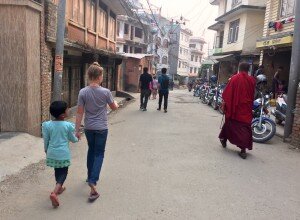 What I’ve learned is this lack of dreaming is part of a cultural experience that I am only beginning to slightly, barely understand. I can only share as much as I “know” or kinda know at this point…but it fascinates me.Opportunity is a cultural phenomenon, not only based in language but woven into the social fabric of cultures over millennia from gender, status, class, birthright, not to mention access to education.As a leadership coach, therapist and general cheerleader of humans, (yay), I ask people wherever I go what inspires them, if they could do anything in the world, what would they do? Some people start conversations with where are you from? What do you do? I’ve been known to lead with the aforementioned.
What I’ve learned is this lack of dreaming is part of a cultural experience that I am only beginning to slightly, barely understand. I can only share as much as I “know” or kinda know at this point…but it fascinates me.Opportunity is a cultural phenomenon, not only based in language but woven into the social fabric of cultures over millennia from gender, status, class, birthright, not to mention access to education.As a leadership coach, therapist and general cheerleader of humans, (yay), I ask people wherever I go what inspires them, if they could do anything in the world, what would they do? Some people start conversations with where are you from? What do you do? I’ve been known to lead with the aforementioned.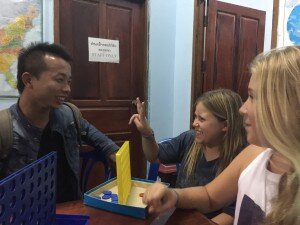 I sat with a group of young adult men between the ages of 19-21 in Laos and was both surprised and saddened when I asked them what they would do for work if anything were possible. NONE of them could even conceptualize that, and by the way, forget it if they were women. The young women don’t even show up for the English language-tutoring program where I was helping out (a whole other story, but you can imagine even less encouragement for their “I have a dream” vision creation).Most of these young men were still in high school, having come down from the villages to learn, start schooling later and are already behind. They explained that job opportunities, which are limited, in general in Laos are either handed down from a family member or procured through nepotism. While they agreed engineering would be a good job and what Laos needs most right now, they couldn’t even imagine the trajectory of working hard to go for their dream. One would like to do it, but he already “knows” he’s not smart enough. Another said, the only way to get a good job is if you know someone or through inheritance.As magical as Bhutan was, I asked a great deal of questions and while the Bhutanese, in general, seem to protect their reputation as a nation and all it’s magic, there is a great deal of nepotism running the show there, more than upward mobility Aldous Huxley magic.I understand this topic, examining opportunity from a cultural perspective is a big one, like 5 year Ph.D dissertation big, yet as the founder of a business and non-profit that celebrates vision and empowered self-direction in all areas of life, I am intrigued and fascinated by the disparities in the world.I met an incredibly bright twenty-six year old man while trekking in Nepal. He finished his undergrad at UCLA in two years and will be attending Columbia University for his Masters in International Development in the fall. He has been to more than 80 countries! I hadn’t met anyone in a long time (ever) that could speak so eloquently about the development needs and challenges of so many places. When I asked Will if he had to choose the one most important sector in terms of international development, I was convinced he’d say something about resource management or saving the forests and oceans (I am a hopeless treehugger). He said education.
I sat with a group of young adult men between the ages of 19-21 in Laos and was both surprised and saddened when I asked them what they would do for work if anything were possible. NONE of them could even conceptualize that, and by the way, forget it if they were women. The young women don’t even show up for the English language-tutoring program where I was helping out (a whole other story, but you can imagine even less encouragement for their “I have a dream” vision creation).Most of these young men were still in high school, having come down from the villages to learn, start schooling later and are already behind. They explained that job opportunities, which are limited, in general in Laos are either handed down from a family member or procured through nepotism. While they agreed engineering would be a good job and what Laos needs most right now, they couldn’t even imagine the trajectory of working hard to go for their dream. One would like to do it, but he already “knows” he’s not smart enough. Another said, the only way to get a good job is if you know someone or through inheritance.As magical as Bhutan was, I asked a great deal of questions and while the Bhutanese, in general, seem to protect their reputation as a nation and all it’s magic, there is a great deal of nepotism running the show there, more than upward mobility Aldous Huxley magic.I understand this topic, examining opportunity from a cultural perspective is a big one, like 5 year Ph.D dissertation big, yet as the founder of a business and non-profit that celebrates vision and empowered self-direction in all areas of life, I am intrigued and fascinated by the disparities in the world.I met an incredibly bright twenty-six year old man while trekking in Nepal. He finished his undergrad at UCLA in two years and will be attending Columbia University for his Masters in International Development in the fall. He has been to more than 80 countries! I hadn’t met anyone in a long time (ever) that could speak so eloquently about the development needs and challenges of so many places. When I asked Will if he had to choose the one most important sector in terms of international development, I was convinced he’d say something about resource management or saving the forests and oceans (I am a hopeless treehugger). He said education.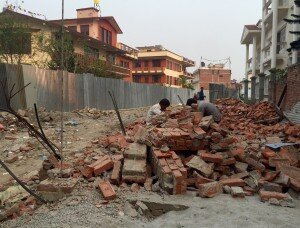 Education starts with language.What I learned in Nepal is there are actually different words for work and opportunity in both Nepali and Tibetan. While the caste system in India and Nepal are complex social and historic systems I can’t begin to understand (or accept, even, sorry), I just have to marvel at how effective it’s been for really keeping people in their place. There is quite literally no language for if you can do anything, what would you do? What would you be? How do you want to express yourself in the world? Let alone conceptual understanding and belief.With my white privilege, English-language informed reality and beliefs I look like a complete goon to some of these people with whom I interact, because my basic beliefs, literally don’t translate.While I love this world and all it’s mind-boggling madness and beauty, I am grateful that I have finally channeled my misplaced tenacity into what I think is good work. I desire, aspire and work towards contributing to a more just world, perhaps a more fair, inspired and loving world; this is the work of Wellfit Institute, Wellfit Girls and even my daughters’ mediocre elementary education by mom.As for what and when will inspire my girls to direct their tenacity to procure dessert to global leadership…that remains to be seen.In loving-kindness,
Education starts with language.What I learned in Nepal is there are actually different words for work and opportunity in both Nepali and Tibetan. While the caste system in India and Nepal are complex social and historic systems I can’t begin to understand (or accept, even, sorry), I just have to marvel at how effective it’s been for really keeping people in their place. There is quite literally no language for if you can do anything, what would you do? What would you be? How do you want to express yourself in the world? Let alone conceptual understanding and belief.With my white privilege, English-language informed reality and beliefs I look like a complete goon to some of these people with whom I interact, because my basic beliefs, literally don’t translate.While I love this world and all it’s mind-boggling madness and beauty, I am grateful that I have finally channeled my misplaced tenacity into what I think is good work. I desire, aspire and work towards contributing to a more just world, perhaps a more fair, inspired and loving world; this is the work of Wellfit Institute, Wellfit Girls and even my daughters’ mediocre elementary education by mom.As for what and when will inspire my girls to direct their tenacity to procure dessert to global leadership…that remains to be seen.In loving-kindness,

